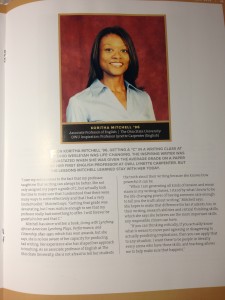On Monday, November 10th, I spoke on a roundtable titled “Trigger Warnings & Tough Topics in the Classroom.” I was asked to join this discussion because I have so often articulated my approach to teaching literature that is peppered (or saturated) with the N-word. Besides conversations with my students and with colleagues around the country, I discuss this issue in “Belief and Performance, Morrison and Me,” which can be downloaded from the “Intellectual Autobiography” section of Books+Articles.
Monday’s roundtable was very much a response to national concerns regarding whether professors should provide trigger warnings when teaching controversial and/or painful material. Each speaker gave me new ways to think about the issue, but all of their stances require that instructors have exactly what American society encourages us not to have: courage.
The timing of this roundtable created an eerie effect for me. My alma mater’s magazine just published an article that captures why doing what I think will help students grow, whether it is comfortable or not, has been a hallmark of my life in the classroom. The feature made me realize just how long I have believed that growth is rarely comfortable. Because I want to equip students to make this country to live up to its creed, I guide them to grapple with the various forms of aggression that result from Americans’ investment in racism, (hetero)sexism, and classism, including racial violence, sexual violence, anti-LGBT violence, grossly unequal access to education, and overexposure to incarceration.
As the feature makes clear, the fact that writing effectively is difficult (and usually involves an ugly process) is another reality with which I want my students to grapple. The online version is here: At the Root of Great Teaching. (page 25)



